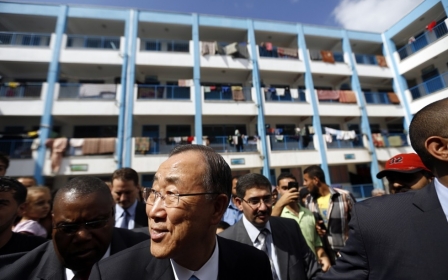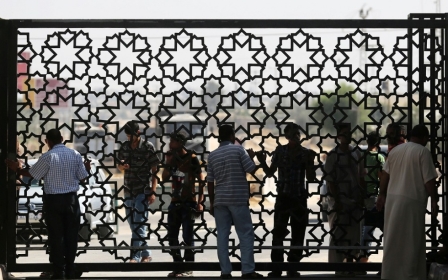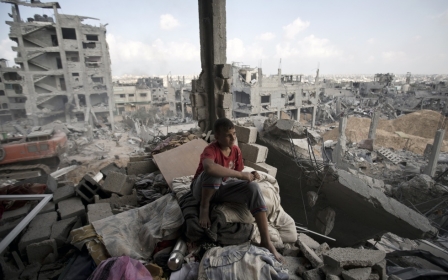'Reconstructing Gaza': one conference, many agendas

Attendees at Sunday’s Reconstructing Gaza conference, held at a hotel-turned-fortress in the so-called “New Cairo” (Heliopolis, really a massive gated community for the Egyptian elite), heard hours of speeches from dignitaries around the world claiming sympathy and support for the 1.8 million inhabitants of war-torn Gaza. And several themes gradually became obvious:
1. The world’s powerbrokers are finally agreeing that the Israeli blockade of Gaza must come to an end.
2. That first goal appears to be magical thinking.
3. As important as the reconstruction of Gaza after the 51-day Israeli assault - maybe even more important - is assuring that “their man” (Mahmoud Abbas) is back in power.
4. Egypt’s own blockade of Gaza is a taboo subject; in fact, one of the big winners at the conference was strongman Abdel Fattah al-Sisi.
5. Gaza was talked about a lot, but was missing from the conference in ways that often matter the most.
6. It is going to be very hard to hold accountable everyone who is grabbing a piece of the large, juicy pie that will be the Gaza reconstruction.
Here’s an “inside look” at each of these:
'The club' finally says no more blockade
This is the good news out of the conference. There were a lot of high-level representatives in attendance, ranging from the rather symbolic Ban Ki-Moon (UN secretary general) to “Israel’s lawyer,” US Secretary of State John Kerry. The 50-plus dignitaries who made public statements to the audience unanimously agreed that it will not be sufficient to return Gaza to the “status quo” that existed before the war. They are tired of rebuilding, only to have the infrastructure into which they poured so many dollars blown up by Israeli tanks and aircraft. The blockade, which is the root cause for the wars, must come to an end.
“Israel can’t keep destroying Gaza, and expecting the international community to foot the bill,” Ban said. “Let’s not lose sight of the root cause of all of the conflicts – an occupation that has lasted almost half a century. This is the moment for transformational change. Let this (donor) conference be the most successful…and let it be the last.”
Borge Brende, minister of foreign affairs for Norway and co-host of the conference said: “I recently returned from Gaza and the images are still fresh in my mind. This cycle of destroy-and-rebuild, destroy-and-rebuild must be broken. That’s the consensus I hear today: We can no longer wait for better days, for the stars to align. The Israeli closure regime is a failure and must be reversed.”
Magical thinking reigns
Although these words from Ban and Brende were positive, no one said anything, with few exceptions, about how that would happen. There seemed to be an almost childlike belief that the endless negotiations that have stopped and started for more than 20 years would suddenly produce results and everyone would live happily ever after.
In fact, the plan developed by UN Envoy Robert Serry for persuading Israel to allow supplies into Gaza for reconstruction - praised by virtually everyone at the conference - will not only further entrench Gaza’s dependence, but also make the international community complicit.
For example, under the plan, a steering team consisting of representatives of the Abbas unity government, Israel and the UN will supervise all processes. Supplies ordered for both private homes and large-scale public works - including schools and factories - must be entered into a central tracking database that, according to The Guardian, is accessible to Israeli intelligence agencies.
“I didn’t hear any ideas about how the occupation will actually be brought to an end after all this time,” commented Hesham Youssef, assistant secretary general for humanitarian affairs with the Organisation of Islamic Cooperation. “I also didn’t hear anyone demand that Israel be held accountable for its war crimes, and it should be.”
'Our man Abbas'
It was like a universal mantra at the conference: Mahmoud Abbas and the Palestinian Authority (the two were used interchangeably) must be in charge of Gaza in order for aid to flow, reconstruction to be successful and peace to somehow be possible.
“(Abbas) must be empowered in everything we do. PA customs officials must be in charge of Gaza’s borders, and the authority must expand its control of Gaza. There is always the possibility that Hamas will strike at civilians, putting the people of Gaza at risk, so we have to support him in every way possible,” said US Secretary of State John Kerry.
But wait…isn’t it the unity government that is supposed to govern Gaza now (meaning it allegedly represents all factions)? And doesn’t it take two or more parties to agree to form a unity government? Likewise, isn’t it just a bit of a colonialist throwback to dictate to the Palestinian people who their leader should be? (Reminder: elections haven’t been held for Palestinians since 2006.)
Sisi: the other winner
Abdel Fattah Al-Sisi, the military strongman who led a coup to depose the democratically elected Egyptian President Mohammed Morsi, has imposed a blockade on Gaza that is nearly as onerous and unpredictable as Israel’s. His legendary hatred of the Muslim Brotherhood, of which Hamas is an offshoot, has led to many arbitrary imprisonments of anyone who appears sympathetic to the group or protests his dictates. Likewise, during the Israeli assault on Gaza, Sisi acted as if he was collaborating with Israel (and Abbas) to destroy Hamas at the expense of the inhabitants of Gaza.
Yet, Sisi described his leadership this way: “The Palestinian people are a cause all Arab people share. And thus, Egypt shouldered the responsibility of ending the slaughter of innocent Palestinians (by negotiating a ceasefire). It is impossible to think of returning them to the status quo.”
One by one, virtually every speaker at the Reconstructing Gaza conference thanked Sisi for his humane leadership. The delegate from South Africa, which of all countries should sympathise the most with Palestinians as a result of its own experience with apartheid, said: “South Africa wishes to express its immense appreciation for the role of Egypt and the leadership of President Sisi,” said International Relations Minister Maite Nkoana-Mashabane. “And I am particularly grateful that Egypt allowed South African medical teams to minister to the people of Gaza.”
She is grateful for Sisi “allowing” medical teams in? Is this not basic, required humanity? Yet this also is an expectation Sisi has failed to fulfill many other times.
Where were the Gazans?
The title of the conference focused on Gaza, all of the speeches talked about Gaza, and the budgets of millions of dollars being bandied about were described as allocated to Gaza. Yet in many other ways, Gaza was curiously absent.
The only Palestinians living in Gaza who were visible at the conference were a few in UN agency posts and a handful of others who appeared in a short video shown by Mohammed Mustafa, the Ramallah-based deputy prime minister of the new and still struggling unity government. The latter individuals, however, were shown as victims.
None of the many experts who live there were asked to share their perspective.
For example, Omar Shaban, initiator of the new, grassroots initiative Aid Watch Palestine and founder of the Gaza-based PalThink for Strategic Studies, was just one of the civil society leaders who had hoped to attend, but was not provided with an invitation or an Egyptian visa.
Follow the money
A total of $5.4 billion was pledged for Palestinian support by donor countries at the conference, half of which was earmarked specifically for Gaza reconstruction. That’s a lot of money (although short of Abbas’ projected need of $4 billion). However, it is unclear how much of that are newly allocated funds, and when it will actually be disbursed. The funds actually donated following Operation Cast Lead in 2009 ended up falling far short of the pledges.
Likewise, many of the donor countries specified portions of their allocations for specific projects. Through which entity will all of that money be channelled? Who will monitor what it is spent on? And how will those expenses be coordinated with the 40-plus UN-affiliated agencies that raise and spend money for Gaza as well?
In “National Early Recovery and Reconstruction Plan for Gaza”, a report presented by the Palestinians at the conference, a bewildering network of committees that will oversee and advise on the spending of the money are outlined, but its interface with the UN (and Israel) is vague. Although a central database is promised to track every donation and expense (for Israel’s use as well), the details are thin.
In a prescient article published in al-Monitor last month, editor-in-chief of Gaza's Al-Eqtisadiah newspaper, Mohammed Abu Giab, warned: “Some companies are arranging their papers, contracts and agreements in secret to suck Gazan blood and loot people's money under the pretext of facilitating and of supporting, reviving and reconstructing the private sector.”
It will be critical to build transparency and accountability into the system, along with mechanisms for grassroots participation in planning and monitoring. If not, Gaza is in danger of being traumatised even further by all the “kindness” on display in Cairo.
Middle East Eye propose une couverture et une analyse indépendantes et incomparables du Moyen-Orient, de l’Afrique du Nord et d’autres régions du monde. Pour en savoir plus sur la reprise de ce contenu et les frais qui s’appliquent, veuillez remplir ce formulaire [en anglais]. Pour en savoir plus sur MEE, cliquez ici [en anglais].





